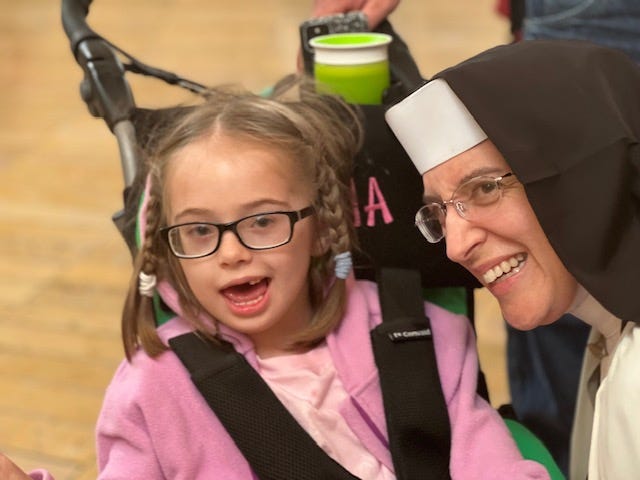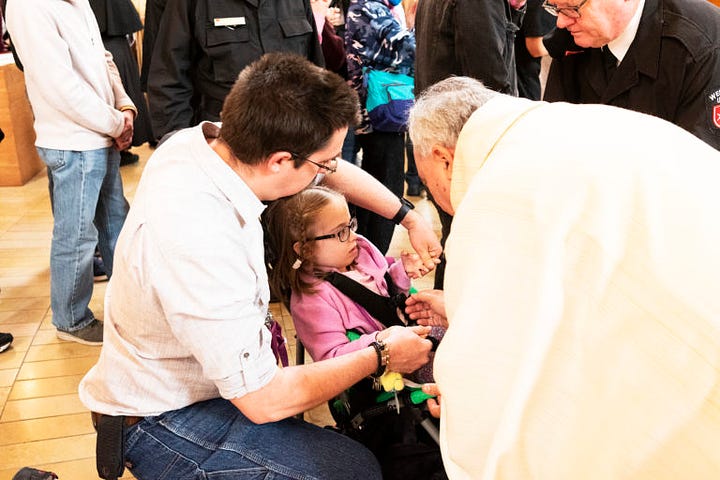We should treat each other with kindness, but special kindness should be extended to those who serve God in a special way. Priests, nuns, lay ministers at mass. They all help us reach up to God, and we should thank them for their service.


Reading 1
2 Kgs 4:8-11, 14-16a
One day Elisha came to Shunem, where there was a woman of influence, who urged him to dine with her. Afterward, whenever he passed by, he used to stop there to dine. So she said to her husband, "I know that Elisha is a holy man of God. Since he visits us often, let us arrange a little room on the roof and furnish it for him with a bed, table, chair, and lamp, so that when he comes to us he can stay there." Sometime later Elisha arrived and stayed in the room overnight.
Later Elisha asked, "Can something be done for her?"
His servant Gehazi answered, "Yes! She has no son, and her husband is getting on in years."
Elisha said, "Call her."
When the woman had been called and stood at the door, Elisha promised, "This time next year you will be cradling a baby son."
This story fits right in with the daily mass readings about Abraham and Sarah being promised a child. They both laughed at the idea. Strangely, the lectionary omits the Shunemmite woman’s response: She said, “My lord, you are a man of God; do not deceive your servant.”
She has her doubts, but she doesn’t laugh; in fact, she’s worried she’s being laughed at.
No one’s laughing at her. Elisha is repaying her for her kindness. Hospitality for strangers was important in the ancient world, but she took it even further—she set up a special room just for Elisha, because he was a man of God.
God doesn’t need anything from us, but His servants do. We ought to consider what we could be doing for the men and women of God in our lives.
Responsorial Psalm
Ps 89:2-3, 16-17, 18-19
R. For ever I will sing the goodness of the Lord.
The promises of the LORD I will sing forever,
through all generations my mouth shall proclaim your faithfulness.
For you have said, "My kindness is established forever;"
in heaven you have confirmed your faithfulness.
R. For ever I will sing the goodness of the Lord.
Blessed the people who know the joyful shout;
in the light of your countenance, O LORD, they walk.
At your name they rejoice all the day,
and through your justice they are exalted.
R. For ever I will sing the goodness of the Lord.
You are the splendor of their strength,
and by your favor our horn is exalted.
For to the LORD belongs our shield,
and to the Holy One of Israel, our king.
R. For ever I will sing the goodness of the Lord.
Despite what these excerpted verses sound like, this is actually a song written after David’s defeat. The Israelites were worried that it looked like God’s promise of David becoming the king of kings wouldn’t come true.
But instead of despairing in the moment, they double-down on their faith, and praise God anyway. They remain steadfast in their hope.
Reading 2
Rom 6:3-4, 8-11
Brothers and sisters: Are you unaware that we who were baptized into Christ Jesus were baptized into his death? We were indeed buried with him through baptism into death, so that, just as Christ was raised from the dead by the glory of the Father, we too might live in newness of life.
If, then, we have died with Christ, we believe that we shall also live with him. We know that Christ, raised from the dead, dies no more; death no longer has power over him. As to his death, he died to sin once and for all; as to his life, he lives for God. Consequently, you too must think of yourselves as dead to sin and living for God in Christ Jesus.
Paul is responding to the accusation that the Gospel promotes moral laxity, because of God’s forgiveness.
But God forgives because Jesus died for our sins. That doesn’t mean we can just keep on doing whatever we want. Jesus rose from the dead, rejected the grave. We should, likewise, move foreward, reject our sins and live in Christ.
Alleluia
1 Pt 2:9
R. Alleluia, alleluia.
You are a chosen race, a royal priesthood, a holy nation;
announce the praises of him who called you out of darkness into his wonderful light.
R. Alleluia, alleluia.
Here, Peter is reading God’s promises to Israel1 and applying them to Christianity as a whole. This transcends all natural and national divisions and unites the people into one community.
Gospel
Mt 10:37-42
Jesus said to his apostles: "Whoever loves father or mother more than me is not worthy of me, and whoever loves son or daughter more than me is not worthy of me; and whoever does not take up his cross and follow after me is not worthy of me. Whoever finds his life will lose it, and whoever loses his life for my sake will find it.
"Whoever receives you receives me, and whoever receives me receives the one who sent me. Whoever receives a prophet because he is a prophet will receive a prophet's reward, and whoever receives a righteous man because he is a righteous man will receive a righteous man's reward. And whoever gives only a cup of cold water to one of these little ones to drink because the little one is a disciple— amen, I say to you, he will surely not lose his reward."
Jesus isn’t saying we shouldn’t love our parents or kids. That would contradict just about everything else Jesus says elsewhere.2
No, He wants us to love our family and friends and everyone. But He also wants us to love the One who gave them to us. God is the one who put those people in our lives, who gave us life itself.
Our gratitude should go back to the source of everything. And in that gratitude and love, that’s where we’ll end up, too.
Some less-than-intelligent enemies of Christianity see a contradiction and simply stop right there, as if the argument is now over.



